
“I think this strike has been fuelled by certain LLRA politicians. Hardly anyone could deny that. I would like to say very clearly that this is politicizing,” Butkevičius told the national radio LRT on Tuesday morning.
He rejected demands by the strike organizers to cancel the standardized Lithuanian language exam for all schools, raise the per-student funding for ethnic minority schools and also introduce a compulsory Polish (mother tongue) language exam.
According to Butkevičius, the results of the Lithuanian language exam show that students from Polish schools outperform their peers from Lithuanian schools. The prime minister cited figures showing that only 2.7 percent of graduates from Polish schools failed the exam, compared to 5.3 percent among students from Lithuanian schools.
“The demand to introduce a compulsory Polish language exam for the Polish minority would be a legal violation. Polish children would have one additional exam and that, I think, would be discriminatory,” the prime minister said.
He also underlined that funding for ethnic minority schools was already better than that for Lithuanian schools. “In 2014, one pupil in Šalčininkai District (with a large Polish population) received EUR 2,224, and the country’s average is EUR 1,604,” he said.
Presidential adviser Rūta Kačkutė told the Žinių Radijas news radio that the education situation for ethnic minorities in Lithuania was one of the best in the EU.
“Because education conditions for Poles, Russians and Belarusians are not only created to study their native language but also receive education from the kindergarten to university in their native language,” she said.
“We really don’t want children from ethnic minority schools to become tools of political games,” she said.
The LLRA announced on Friday that Polish and Russian schools in Lithuania planned to strike as of September 2, demanding a repeal of the standardized Lithuanian-language exam and increasing the value of the so-called student’s basket for minority schools by a factor of one and a half.
The party says that Polish and Russian speakers want the cancellation of legal amendments adopted in 2011. The protest organizers also demand that the Polish-language exam be included into the list of mandatory exams at Polish schools.
The statement was issued by the LLRA and named the strike committees of Polish schools in Lithuania, the Forum of Parents from the Polish Schools in Lithuania and the committees for the defence of schools as it authors.

Be the first to comment